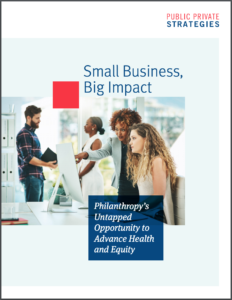 Small Business, Big Impact: Philanthropy’s Untapped Opportunity to Advance Health and Equity
Small Business, Big Impact: Philanthropy’s Untapped Opportunity to Advance Health and Equity
Public Private Strategies
First published October 2019
Leaders in philanthropy increasingly recognize the role of business in advancing their objectives. To date, the focus of most efforts to engage business has been primarily on large companies. By contrast, the role of small business in creating healthy, equitable communities has generally not been explored.
This is not entirely surprising for several reasons: 1) large businesses present scale opportunities out of the gate. For example, a single corporate policy change at Walmart can affect more than two million employees; 2) large corporations exert considerable influence on their peers and the public. When large companies act, their efforts tend to be newsworthy and cause ripple effects across their peers and society at large; and 3) large, publicly-traded companies are relatively transparent and offer a source of considerable data that can be used to make the case for public health collaboration and measure progress toward a goal.
Yet small businesses are an untapped resource and could be a critical partner in creating opportunities for everyone to live a healthy life. Small business influences the financial lives of roughly 30% of the U.S. population: Nearly 100 million people generate their livelihoods from small businesses as either owners or employees.2 These businesses are in every state in the country, representing more than 90% of all businesses in every state. Their voices are trusted at a time when confidence in government, media and other institutions is generally declining.
Download Resource